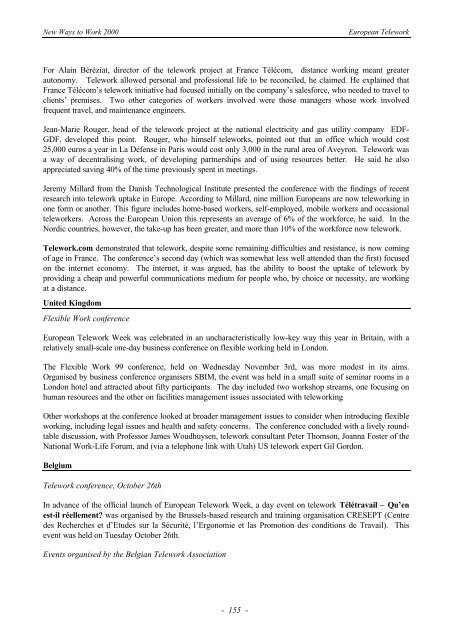eWORK 2000 - European Telework Week
eWORK 2000 - European Telework Week
eWORK 2000 - European Telework Week
- No tags were found...
Create successful ePaper yourself
Turn your PDF publications into a flip-book with our unique Google optimized e-Paper software.
New Ways to Work <strong>2000</strong><strong>European</strong> <strong>Telework</strong>For Alain Béréziat, director of the telework project at France Télécom, distance working meant greaterautonomy. <strong>Telework</strong> allowed personal and professional life to be reconciled, he claimed. He explained thatFrance Télécom’s telework initiative had focused initially on the company’s salesforce, who needed to travel toclients’ premises. Two other categories of workers involved were those managers whose work involvedfrequent travel, and maintenance engineers.Jean-Marie Rouger, head of the telework project at the national electricity and gas utility company EDF-GDF, developed this point. Rouger, who himself teleworks, pointed out that an office which would cost25,000 euros a year in La Défense in Paris would cost only 3,000 in the rural area of Aveyron. <strong>Telework</strong> wasa way of decentralising work, of developing partnerships and of using resources better. He said he alsoappreciated saving 40% of the time previously spent in meetings.Jeremy Millard from the Danish Technological Institute presented the conference with the findings of recentresearch into telework uptake in Europe. According to Millard, nine million <strong>European</strong>s are now teleworking inone form or another. This figure includes home-based workers, self-employed, mobile workers and occasionalteleworkers. Across the <strong>European</strong> Union this represents an average of 6% of the workforce, he said. In theNordic countries, however, the take-up has been greater, and more than 10% of the workforce now telework.<strong>Telework</strong>.com demonstrated that telework, despite some remaining difficulties and resistance, is now comingof age in France. The conference’s second day (which was somewhat less well attended than the first) focusedon the internet economy. The internet, it was argued, has the ability to boost the uptake of telework byproviding a cheap and powerful communications medium for people who, by choice or necessity, are workingat a distance.United KingdomFlexible Work conference<strong>European</strong> <strong>Telework</strong> <strong>Week</strong> was celebrated in an uncharacteristically low-key way this year in Britain, with arelatively small-scale one-day business conference on flexible working held in London.The Flexible Work 99 conference, held on Wednesday November 3rd, was more modest in its aims.Organised by business conference organisers SBIM, the event was held in a small suite of seminar rooms in aLondon hotel and attracted about fifty participants. The day included two workshop streams, one focusing onhuman resources and the other on facilities management issues associated with teleworkingOther workshops at the conference looked at broader management issues to consider when introducing flexibleworking, including legal issues and health and safety concerns. The conference concluded with a lively roundtablediscussion, with Professor James Woudhuysen, telework consultant Peter Thomson, Joanna Foster of theNational Work-Life Forum, and (via a telephone link with Utah) US telework expert Gil Gordon.Belgium<strong>Telework</strong> conference, October 26thIn advance of the official launch of <strong>European</strong> <strong>Telework</strong> <strong>Week</strong>, a day event on telework Télétravail – Qu’enest-il réellement? was organised by the Brussels-based research and training organisation CRESEPT (Centredes Recherches et d’Etudes sur la Sécurité, l’Ergonomie et las Promotion des conditions de Travail). Thisevent was held on Tuesday October 26th.Events organised by the Belgian <strong>Telework</strong> Association- 155 -








